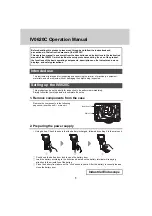
6.4 Input:
inPut
The Input function contains two sub-functions
inP
.
tYPE
and
dEbounCE
which configure the
Tachometer input and define the amount of input
noise rejection.
6.5 Input type:
inP
.
tYPE
inP
.
tYPE
is a sub-menu in the
inPut
function which
defines the type of input sensor or input pulse with
which the Tachometer will function. To check or
change the type of input, select
inPut
in the main
configuration menu and press
(
which will reveal the
inP
.
tYPE
prompt, pressing
(
again will show the
present type of input
.
If set as required press
)
twice to return to the configuration menu, or
repeatedly press the
&
or
*
button until the
required type of input is displayed and then press
)
twice to return to the configuration menu.
One of following six types of input may be selected:
Switching
thresholds
Low High
oP
.
CoL
Open collector
2
2
10k
Ω
VoLt5L
Voltage pulse low
1
1
3V
VoLt5H
Voltage pulse high
1
3
10V
CoiL
Magnetic pick-off
0
40mV
Pr
.
dEt
Proximity detector
2
1.2
2.1mA
ContACt
Switch contact
2
100
1000
Ω
Notes:
1
Maximum voltage input +30V.
2
For sensors that require energising i.e.
proximity detectors, switch contacts and
open collectors, terminals 3 & 4 of the
Tachometer should be linked together.
3
To count correctly, the input pulse must fall
below the lower switching threshold and rise
above the higher switching threshold.
4
See section 6.6 for the typical maximum
operating frequency.
6.6 Debounce:
dEbouncE
dEbouncE
is an adjustable sub-menu in the
inPut
function which prevents the Tachometer miscounting
when the input pulse has noisy edges, such as those
resulting from a mechanical contact closing and
bouncing. Three levels of protection may be
selected and the amount of debounce applied
depends upon the type of Tachometer input that has
been selected in the
inP
.
tYPE
function.
The following table shows the minimum time that the
input pulse must be continuously above the upper
input switching threshold and continuously below the
lower switching threshold to ensure that the
Tachometer processes the input pulse. Input
switching thresholds are shown in section 6.5.
De-bounce
level
Min input pulse width
Type of Input
Contact
All others
Default
1600µs
40µs
Heavy
3200µs
350µs
Light
400µs
5µs
The Tachometer’s maximum counting frequency
depends upon the debounce level selected, the
shape of the input pulse and its amplitude. The
following table assumes a square wave input and is
only for guidance. The maximum operating
frequency will be lower if the input pulses have
sloping edges and the pulse amplitude only slightly
exceeds the input switching thresholds.
ONLY FOR GUIDANCE
Debounce
level
Max counting frequency
Type of input
Contact
All others
Default
250Hz
12kHz
Heavy
120Hz
2kHz
Light
1000Hz
100kHz
The minimum operating input frequency is 0.01Hz.
Below this frequency the speed display will be forced
to zero.
The
dEbouncE
function is a sub-menu located in the
inPut
function. Select
inPut
in the configuration
menu and press
(
which will reveal the
inP
.
tYPE
prompt, press the
&
or
*
button to select
dEbouncE
followed by
(
to reveal the existing
setting.
Pressing the
&
or
*
button will scroll
through the three levels. When the required level
has been selected, pressing
)
twice will enter the
selection and return the display to the
inPut
prompt
in the configuration menu.
18
Summary of Contents for BA314NG
Page 1: ...Issue 5 9th July 2019 BA314NG Ex nA and Ex tc Tachometer Issue 5...
Page 16: ...16...
Page 17: ...17...
















































